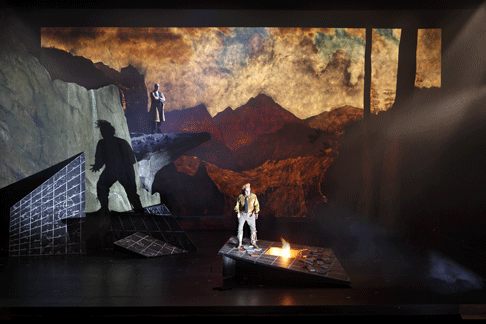The extraordinary extravaganza, in collaboration with the English National
Opera and Teatro Massimo, Palermo, had an initial UK run in London and
garnished solid overall reviews during the summer of 2011. This year’s
audience saw the work on a smaller scale, but with equal power, a dramatic
spectacle deserving continued mention among the best efforts in recent seasons
anywhere.
Gilliam’s choice of placing the central narrative amidst the rise of the
Nazis was a natural fit that avoided cliché pitfalls through startling
portrayals of humanity, both good and evil.
No single act really expanded on the progressive canvas found in places like
Wroclaw or Helsinki, but the show as a whole seemed to up the abstract ante of
opera as a package deal. A couple scenes resembled a warp of “Springtime for
Hitler” in The Producers. Strange, appropriate or not, it usually worked.
For many observers, reportedly including Berlioz himself, this composition
was considered beyond the era’s production capabilities. The story goes that
it took twenty years to bring the project, deemed by the author not as opera
but “legend dramatique” to the public. Even then, the few performances
during his lifetime were in concert form only and the concept wasn’t fully
staged until 1893, twenty four years after Berlioz died.
To profess that the piece received even minimally sporadic revivals since
then is still an over-statement. It is, however, no exaggeration to claim that
ENO and Vlaamse Opera, behind Gilliam and his numerous collaborators and
tutors, have achieved something of a milestone in both scope and genre.
A bitter Berlioz injected personal venom into his take on Goethe’s own
version of the legend. For the rebellious romantic Gilliam, this was not the
same old, horrible Hitler story, regarding visuals or villains. It was also a
misguided love story, and refreshing to see a distinction between the Nazis and
the rest of Germany over history. Still, images of evil either subtle as a
dark, lurking demon or illuminated in gigantic 50’s mad man styled
billboards, stood out strongest among some instant classic sets.
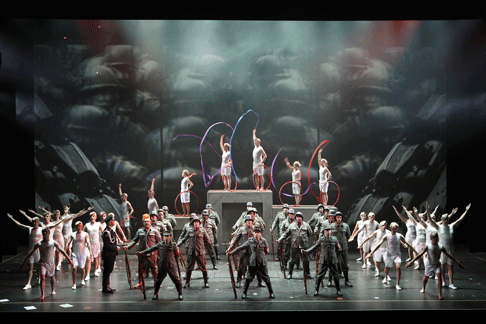
While a few props wouldn’t merit more than a passing grade in a good
college cast, that was a minor flaw. Most sets were stunning. Most important,
they supported a scenes’ intent with more than only ornamentation.
In truth, this performance was more of a visual triumph than anything,
simply because many images burned so brightly. That’s not to imply that the
sound held no fury.
Vocals were fine by everyone, including Michael Spyres in the demanding
title tenor role, which required a huge percentage of the score’s delivery.
Michele Pertusi reached fittingly dark baritone depths as a Mephistopheles with
fantastic facial features, while Simon Bailey held down the bass as Brander.
Maria Riccarda Wessling nailed Marguerite’s mezzo-soprano strength and
vulnerability seamlessly, with her effective “Romance van Margaretha”
emerging as the soloists’ highlight of the night.
There were probably unavoidable moments when sensational sights hindered the
crowd’s connection to the characters, but overall the singers commanded
attention with a shared, subtle strength through restraint. It was definitely a
team effort.
With lesser theatrics, it might have been easier to decide where this music
rightfully belongs in Berlioz’s historical status. Clearly, a vastly helpful
combination of Gilliam, technical advances, and social or audience changes
enhanced and updated Berlioz’s basics.
Massive chorus scenes erupted with rare impact and still struck close to
home in this region. An early exposition of rivalry between Nazis and
Communists played almost as twisted as he real thing.
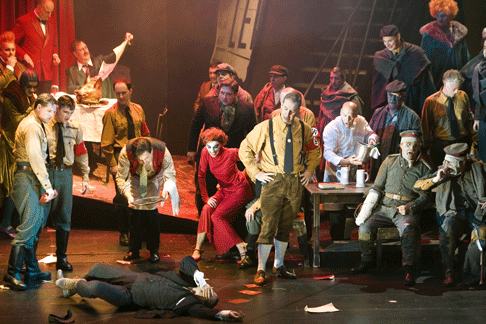
On a night where everyone from the featured singers to the supporting
ensemble deserved the near- raucous reception that greeted them, the standout
performance overall came from the Symphony Orchestra of de Vlaamse Opera, which
provided the strongest statement of actual Berlioz bombast. The crystal clear
SOVO company filled the air with tension, sorrow, and vivid life in a superb
texture of frequent, extreme transitions.
At the curtain calls there were sometimes over a hundred performers on
stage, and doubtless dozens more in the wings who deserved some bows. The
beautiful, ornate house itself had a festive, communal feel that might have
aligned along similar horizons when color came to motion pictures.
Musical Director Dmitri Jurowski provided a strong foundation for the
program’s success, and offered insight into the process.
“I think, in the first place, when we speak about this music we have to
speak about contrasts,” said Jurowski, “For this piece, for this music, and
also for the staging. You have in this music everything which actually appeared
in five or six hundred years, starting with the Renaissance, finishing with
contemporary music. You have to be very flexible here. You cannot just relax
like sometimes, especially in French opera. For me this is not really
(presented as) French opera. It has, of course, all the contents of French
opera, but I think in the first place you have to stay international while you
follow the style the composer is giving. This is the first thing.”
“Then of course, this is one of the pieces you can only do when you have a
production like this. The collaboration with Mr. Gilliam was very important
because we found a story together. It was very difficult because this piece is
constructed in a way that you could start in the middle. You need certain
vision from a director, which makes the music work so you understand the story.
Otherwise, it will be a beautiful evening of music, but you will miss a big
thing.”
“For me, what we had today might be, in a way, a future of opera. We had
moments of classical, old theatre, but at the same time it was not just special
effects. We brought a way to combine the modern technique of movies and the old
spirit of the theatre. I’d like to see these points (continue) in the next
twenty or thirty years.”
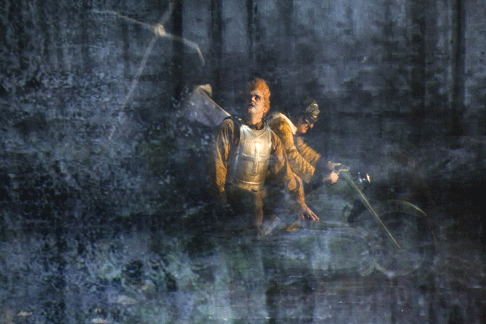
Opera has incorporated video before, in various extremes, but it’s hard to
recall any major production that melded forms so cohesively. Crowd scenes
breathed down your neck, terrified whispers echoed from mountaintops.
There was also plenty of bitter humor, the kind that twisted smiles of
approval or doubt back and forth in the audience. The doomed Faust’s swastika
style crucifixion is arguably the best live-staged use of a straight jacket
since Alice Cooper twisted in the ‘70s.
It says a lot about the presentation’s depth that a pile of female corpses
provides a stirring, climactic image of hope. Faust’s final descent,
Mephistopheles literally at the wheel, careens into a new age of opera
production. Multi-media mayhem ushers in a true, heaven or hellish, eye of the
beholder gamble for opera fans.
We say, jackpot.
During a steady flow of congratulatory, pink champagne and enthusiastic
accolades at a packed reception party, Opera Today got a chance to ask Director
Gilliam, who abstained from libations but still exuded a cheerful buzz; for a
few reflections.
OT: Were there any significant changes in your approach to the
production since the UK shows in May 2011, or in your perception of how the
story should be presented?
Gilliam: Everything is exactly the same. We got it working then, and I see
nothing that was broke, so why fix it? It always changes as you bring in other
actors and other singers. It also changed because this stage is much smaller
than the one in London. All these things, they’re subtle differences.
They’re not major in any way.
OT: Berlioz is sitting in the audience tonight. What would you like him to
be thinking?
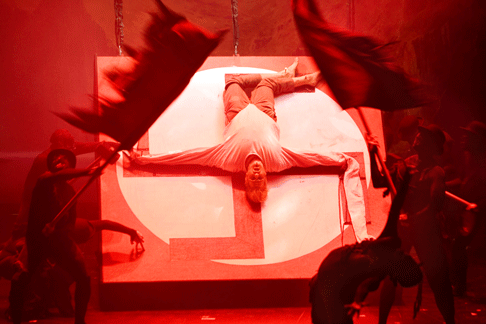
Gilliam: I think, I hope; that our production is as crazed and brilliant as
he was. You’re dealing with a very extraordinary man in Berlioz. The music is
amazing, and actually, what I would really hope is that he’d say ‘You fixed
it for me’, because it’s a thing that never quite worked.
OT: How do you view the medium now that you’ve completed this project as a
relative newcomer, in relation to how you felt before the show came to life
last year?
Gilliam: It’s really hard to judge. I think I’ve learned a lot. I still
don’t know if I really understand opera, even now, having gotten through this
one. I mean, it’s very funny, it depends on who the audience is, and I’m
always surprised that they can sit through some rather long sequences. But
they’re there.
An opera audience is different from a cinema audience and that for me is the
difficult thing, learning I don’t have to keep inventing things every two
seconds like in film. I thought why not use projection, why not do these things
in this situation where you’ve got this ride to hell, basically, and what do
you do?
I saw tapes of a couple other productions and nothing was happening. So I
thought, let’s just do it like an old silent movie, we’ll get the
background moving, the motorcycle will sit still, and it worked brilliantly.
OT: Which scenes were the hardest to pull off?
Gilliam: (after a long, stage-like sigh) I don’t know. It’s really hard
to say. All of them were the same thing. Each one was a nightmare, so it’s
hard to pick. You’ve got to get the balance right and I think we got there in
the end, but it was tricky.
OT: You included some offbeat, lighter moments.
Gilliam: It’s partly because it’s both much lighter than what Berlioz
intended and probably much darker at the same time because once you’re moving
into Germany in the thirties, with anti-Semitism rife, I thought I’m going to
do this bit of music called “Minuette de Follie” which I thought was an
irritatingly pixie, fairy-like music. So I said, let’s do something horrible
instead. We still have Mephistopheles’ imps that do show time, and I like doing
that for the audience. Where something is horrific, then you catch yourself
smiling for a moment when you shouldn’t. I like playing with the audience
that way.
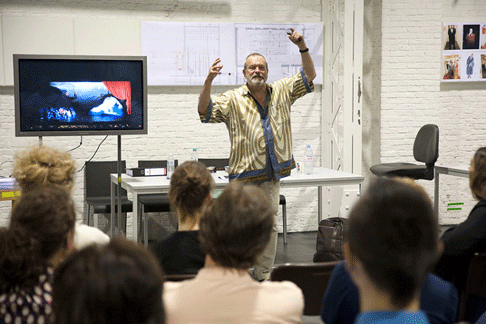 Terry Gilliam [Photo by Debby Huysman / Vlaamse Opera]
Terry Gilliam [Photo by Debby Huysman / Vlaamse Opera]
OT: How did you become involved in the project, and how do you see your
role. Were you more of a driving force or collaborator? Beside normal debut
expectations, did you feel any pressure?
Gilliam: I mean, ENO asked me to do it and they caught me at a time when I
was feeling fairly depressed about the movie business, so I said, yeah. And it
became basically a dialogue, an argument, between me and mister dead Berlioz,
and I think I had big leaps very quickly. There was no pressure. But then, I
was surrounded by some really, really good people. I mean incredibly
experienced. So with my ideas, they were the ones who helped me execute it,
because having never done theatre before, so that was the learning part. I have
to be honest. All the big ideas are mine.
This observer makes no claims regarding knowledge of Berlioz’s motivation,
or any finer tunings of the composer’s musical inclinations. Regardless, the
show was one of the best musical presentations I’ve witnessed, whether
considering cohesive structure or abstract expressions. A great night of opera
says everything, and less than enough.
It’s not hard to imagine Goethe himself having a few hearty grins at this
latest adaption of his enduring interpretation of the ancient tale. Faust’s
process of descent into the hellish madness of Mephistophele‘s lustful lure
has seldom been represented as close to the extended grey areas between
divinity and inevitable damnation Goethe portrayed.
Maybe Intendant Aviel Cahn said it best, with a new feather in his
coordinator cap, as he surveyed the celebration afterward.
“It was an outstanding challenge to stage an opera by Terry Gilliam
because he wants so much of everything. And when you get this, and I know what
Terry’s vision was, I think he was quite happy tonight and that means we did
a hell of a job. I’m very proud to have achieved this with a smaller crew,
because the Flemish Opera doesn’t, of course, have the manpower or resources
of English National Opera. It’s a great thing to start the season with.”
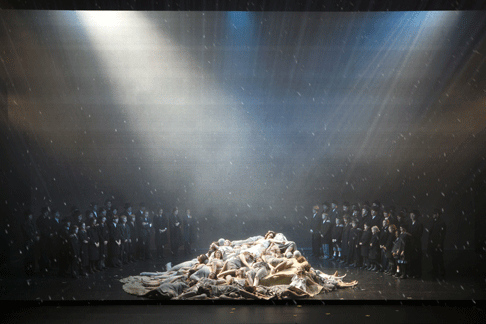
The scene was spectacular for any point of anybody’s calendar, and will
hopefully generate a well deserved holiday surge for Vlaamse Opera. Ghent and
Antwerp are each welcoming locales, with locations in easily accessible,
interesting areas of town.
Cafes in the Ghent lobby and multiple neighboring locations for a quick,
reasonably priced quaff or chomp make for a mini-La Scala type scene inside and
out. At the very least, in this Ghent engagement, the product was equal to the
most renown venues in terms of performance or perimeters.
Whether this revitalized opera grows international legs, and just how far
that U-boat may float is a question, or quest, for the future.
As for Gilliam, it appeared he’s developed a taste for the operatic
discipline. How that evolves in the face of other appetites is another matter
for the sands of time. For this Faust incarnation, Gilliam proved to be a
perfect choice. There were many moments of blazing glory that would stand proud
in any house, or indeed, any era. Tonight, the honors belonged to him, and all
the equally worthy contributing members of Vlaamse Opera.
For now, consider Berlioz’s voluptuously vicious vision of eternal truths
intact and in bloom. In impressive Belgium, Le Damnation de Faust looked and
sounded a lot like modernized redemption. Even, with ferocious fireworks; an
aria of re-inspired resurrection.
Phillip Woolever
Click here for cast and production information.
